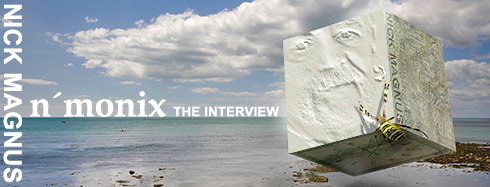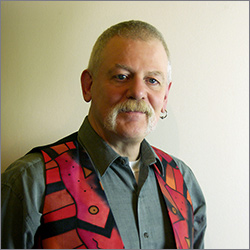- Article
- Read in 6 minutes
Nick Magnus Interview 2014
To coincide with his new album n’monix, we had the chance to discuss a few things with Nick Magnus in a short interview. Martin Brilla provided the questiosn.

GNC: Nick, we interviewed you in Remscheid some five years ago. How has your life changed since then?
Nick: It was at the Remscheid gig [The Steve Hackett Event in Germany, the Editors)] that John Hackett and I met The Watch, who rather took us under their wing. We became good friends, and provided their support act for a number of other gigs over the following couple of years. 2011 saw a mixture of things – I produced an album for singer/songwriter Shirlie Roden (ex-Gordon Giltrap Band), John and I released a live album, and we did some preliminary work on John’s follow-up album to Checking Out of London(still to be completed). We also co-wrote and produced a track for The Rome ProGject album. Somewhere in all this I began working on embryonic ideas for n’monix – although serious work didn’t start until the start of 2012. Most of 2012 was occupied with writing n’monix, with a few notable interruptions including arranging and producing tracks for a forthcoming album project by Odette Swann, guesting on a track for Sarastro Blake’s New Progmantics album, and recording the re-worked version of Camino Royale for Steve’s Genesis Revisited II album… looking back, it was quite a busy time. 2013 was a difficult year – my father had passed away in March, so much of the time was spent dealing with everything you have to go through at those times. Creativity wasn’t high on the list, so it wasn’t until the last part of the year that n’monix was completed.
GNC: You have released two solo albums in the meantime. The latest one has just come out. How did you find the topic of n’monix? Who developed this idea?
Nick: The album’s title actually came very early on – it’s a deliberate mis-spelling of ‘mnemonics’. We originally discussed the idea of basing the entire album around the idea of mnemonics – the memory technique used to store quickly and easily things difficult to remember. The word is derived from the Greek Titan, Mnemosyne, goddess of memory and sister of Cronus. That lead to the general idea of how memory is affected by time, and that memory is ultimately eroded by time. It seemed natural to incorporate all these ideas, rather than just the one, so we deal with mythological, humourous, Grand Guingnol, mnemonic and dementia aspects of time and memory.
GNC: Does Dick have complete freedom with his lyrics? And which is first in the songs with vocals, the music or the lyrics?
Nick: On previous albums it’s generally been a 50/50 split which came first, music or lyrics. In the case of n’monix the lyrics came rather earlier in the process, so I was writing more to the lyrics than the other way round. I actually like it that way, as there’s more opportunity to tailor the music to fit the mood and subject of the lyrics. In a way, neither of us has total freedom – Dick will sometimes have to alter line lengths or certain words to fit a musical phrase, and likewise if Dick has come up with a meter and rhyming structure that works really well then I adapt the music to fit.
GNC:One of the important changes from the predecessor is the stronger orchestral sound. What do you use to create the illusion of a symphony orchestra?
Nick: The sounds I use come from a combination of software and hardware instruments. The hardware consists of various Roland synth modules, but the majority of the sounds – especially the more detailed and articulate sounds – are software instruments, with most of the orchestral stuff coming from Native Instruments’ Kontakt. Software instruments are generally much more realistic, powerful and controllable than their hardware equivalents.
GNC:How did you create the choir at the end of Memory?
Nick: The choir on Memory was performed on a Kontakt instrument called ‘Requiem’. It’s also the same choir used on Shadowland.
GNC:Do you have a favourite piece on n’monix?
Nick: My favourite piece changes according to my mood – but I have a special fondness for Headcase. It’s chunky, playful, slightly mad, and I think it’s one of Dick’s cleverest lyrics.
GNC:What is the biggest difference to Children Of Another God?
Nick: Conceptually the main difference is that Children tells a specific (fictional) story, whereas n’monix explores different aspects of a general thematic idea, in the same way that Hexameron did. You mentioned that you thought there was a stronger orchestral sound, which is interesting. Musically, I think n’monix has more of a ‘rock’ feel, and a harder edge to some tracks – noteably Time, Kombat Kid, Headcase and Eminent Victorians.
 GNC: When we last spoke Children Of Another God had not been released yet. Looking back, what would you like to say about that very fine album?
GNC: When we last spoke Children Of Another God had not been released yet. Looking back, what would you like to say about that very fine album?
Nick: Thank you for the kind words! Children Of Another God was consciously more rocky, less classical in approach than Hexameron, mainly because its story was set in the present day (or near future), and addressed modern-day issues. Having said that, I always try to maintain a balance of different styles, and it really helps to work to a narrative. One aspect of the album that I think works well is the structure, which becomes increasingly darker and ends on a poignant note. Ending that way was a bit of a risk, as albums are generally expected to end on a high – but it worked, and I’m still proud of the end result.
GNC: Steve Hackett plays even more on n’monix than he did on Children Of Another God. You seem to work very well together musically. Would you like to work again with Steve in the studio and live?
Nick: I’m very fortunate and happy that we do still work together on my albums, and it was a real treat to have taken part on the re-recording of Camino Royale that appeared on Genesis Revisited II. Steve’s current band is perfectly matched to what he’s doing now, and he has a superb collaborator in Roger King. Roger’s keyboard playing, production, arrangement and technical skills have become indispensable, and I have to say I’m a huge fan of his work. I’ve always enjoyed working with Steve, and if there was a recording project he wanted me to contribute to (as he did with Camino Royale) then of course I’d love to be involved – as long as it had Roger’s approval. Live work is rather more problematic, as I no longer have a stage keyboard rig!
GNC: One of the things we would like to suggest very seriously as a joint project is a re-recording of Cured, on which you were heavily involved back then. With today’s recording and the experience you have assembled in the meantime this album could sound so much more lively.
Nick: It’s always a tempting idea to look back at things that you feel could be improved – and I’m sure that Cured would benefit from modern technology and accumulated experience on all our parts. Of course, that album itself was the product of modern technology – specifically the LinnDrum, which at the time was very cutting edge, and was given such an ‘up-front’ presence. Cured would undoubtedly have been a very different sounding album if it had been recorded by a band, rather than being a two-man effort. It was a product of its time though, and a valid statement of where we were then.
GNC: Let us give phantasy free reign for a moment: If you had the opportunity, would you tour with n’monix? With a full band, perhaps even with an orchestra?
Nick: It’s a fantasy indeed – the cost of putting n’monix on live would be astronomical! It would need at least a six-piece band, plus an orchestra and an 80-piece choir! Maybe if I won the Lottery…?
GNC: Back to reality – what are your next plans? Are you thinking about a successor to n’monix?
Nick: We’ve already started formulating ideas for the next album – it’s a question of letting those ideas gestate into a firm concept that we can build on. It could well become a collection of individual tales that form part of a greater story – we’ll have to see what happens!
Questions: Martin Brilla
Translation: Martin Klinkhardt
